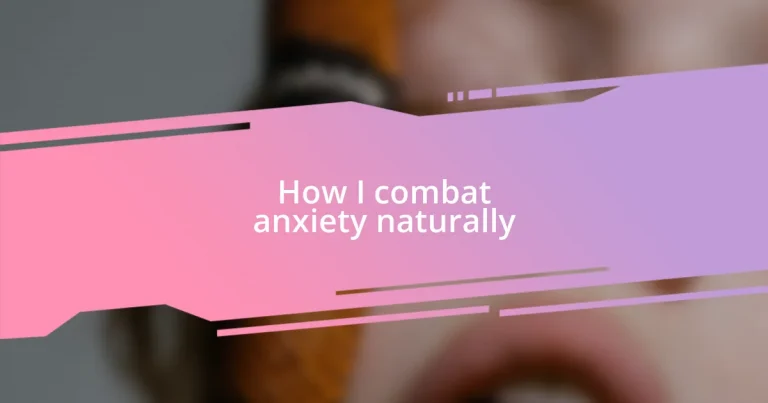Key takeaways:
- Anxiety affects both mental and physical health, leading to symptoms like fatigue, muscle aches, and communication issues in relationships.
- Natural coping methods—such as mindfulness meditation, regular exercise, and a balanced diet—can significantly improve anxiety management and overall well-being.
- Lifestyle changes like reducing caffeine, maintaining a consistent sleep schedule, and nurturing supportive social connections are crucial for reducing anxiety and fostering emotional stability.
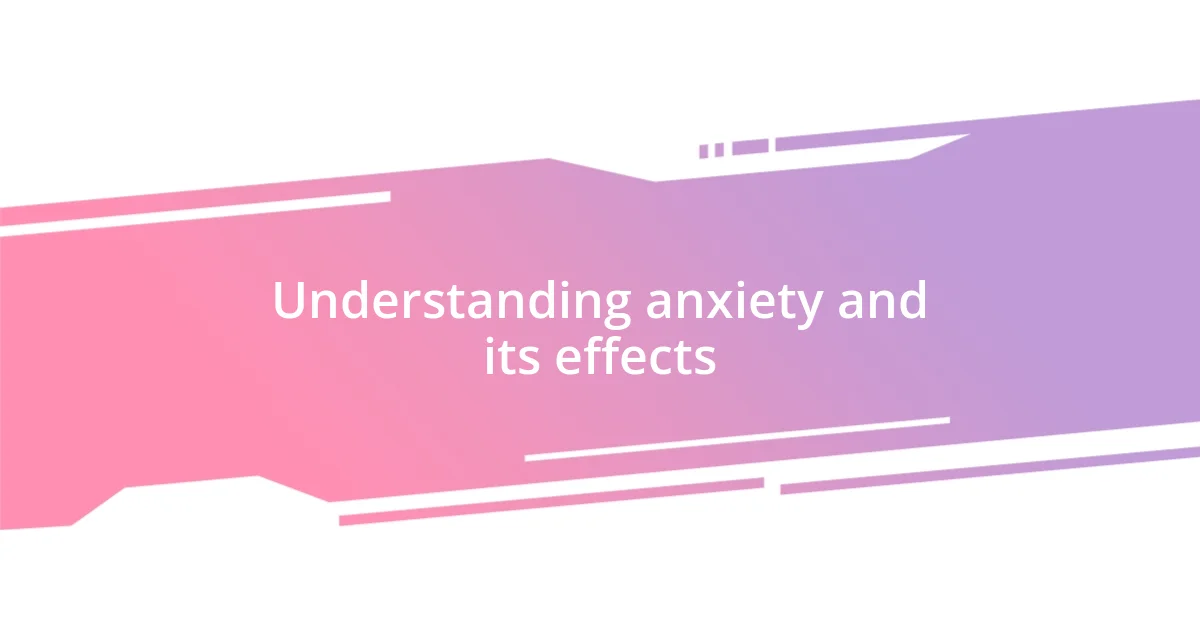
Understanding anxiety and its effects
Anxiety can manifest in various ways, often showing up as racing thoughts, physical tension, and a sense of dread. I remember the first time I experienced it; my heart raced, and my palms felt clammy just at the thought of stepping into a crowded room. Have you ever found yourself wrestling with these uneasy feelings, wondering why something so simple can feel overwhelmingly daunting?
The effects of anxiety are not just mental; they seep into our physical well-being too. Fatigue, muscle aches, and even digestive issues can be side effects of persistent anxiety, creating a vicious cycle that’s tough to break. It’s like my body was sending an SOS signal, and I felt caught in a storm where even small tasks felt monumental. Can you relate to that feeling of being trapped by your own mind and body?
Understanding anxiety also means recognizing how it affects our relationships. I’ve noticed that when I’m in an anxious state, my communication suffers. I tend to withdraw or snap at those I care about, leaving me feeling isolated afterward. Have you ever experienced this disconnect, realizing how your mental state impacts those around you?
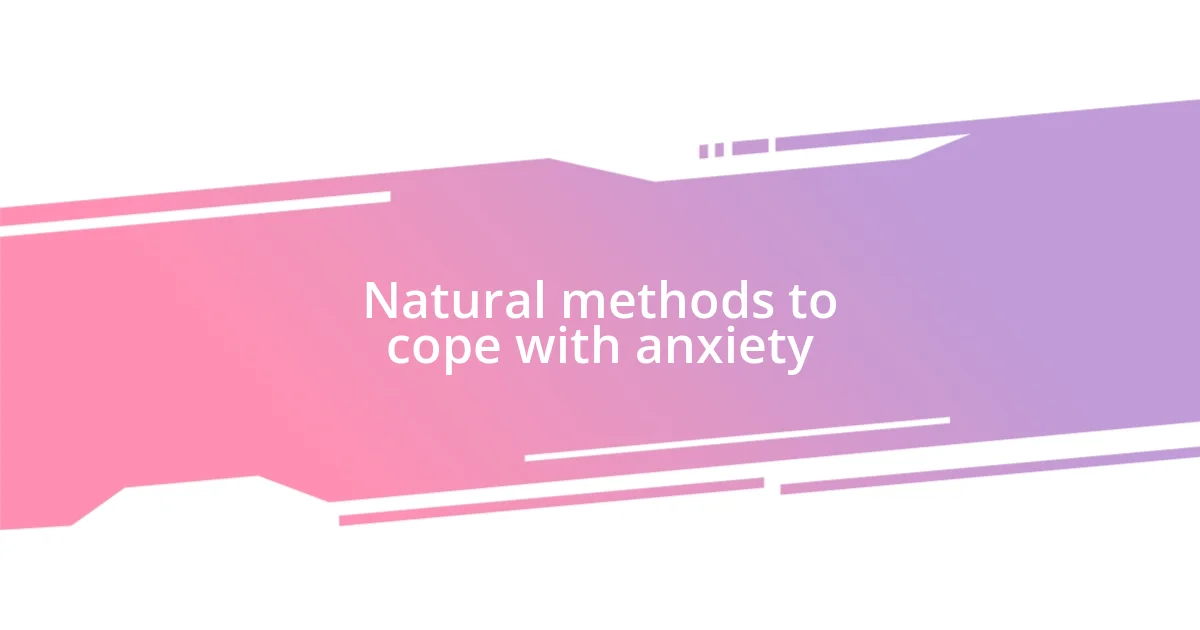
Natural methods to cope with anxiety
Finding natural ways to cope with anxiety has become an essential part of my journey to wellness. I’ve discovered that breathing techniques, like the 4-7-8 method, can calm my racing thoughts in moments of high tension. Taking a few deep breaths not only slows my heart rate but also helps clear my mind, allowing me to regain control.
Here are some natural methods that have worked wonders for me:
- Mindfulness Meditation: Taking just ten minutes a day to focus on my breath helps ground me in the present.
- Regular Exercise: I’ve found that moving my body, whether it’s a brisk walk or a yoga class, decreases stress significantly.
- Herbal Teas: Sipping on chamomile or lavender tea is a daily ritual; these calming drinks soothe my nerves like a warm hug.
- Nature Immersion: Spending time outdoors has a magical way of lifting my spirits; I always return feeling refreshed.
- Adequate Sleep: Prioritizing restful sleep has been crucial for my mental clarity and emotional stability.
Each of these methods brings me a sense of relief and balance, showing how small changes can lead to significant improvements in managing anxiety.
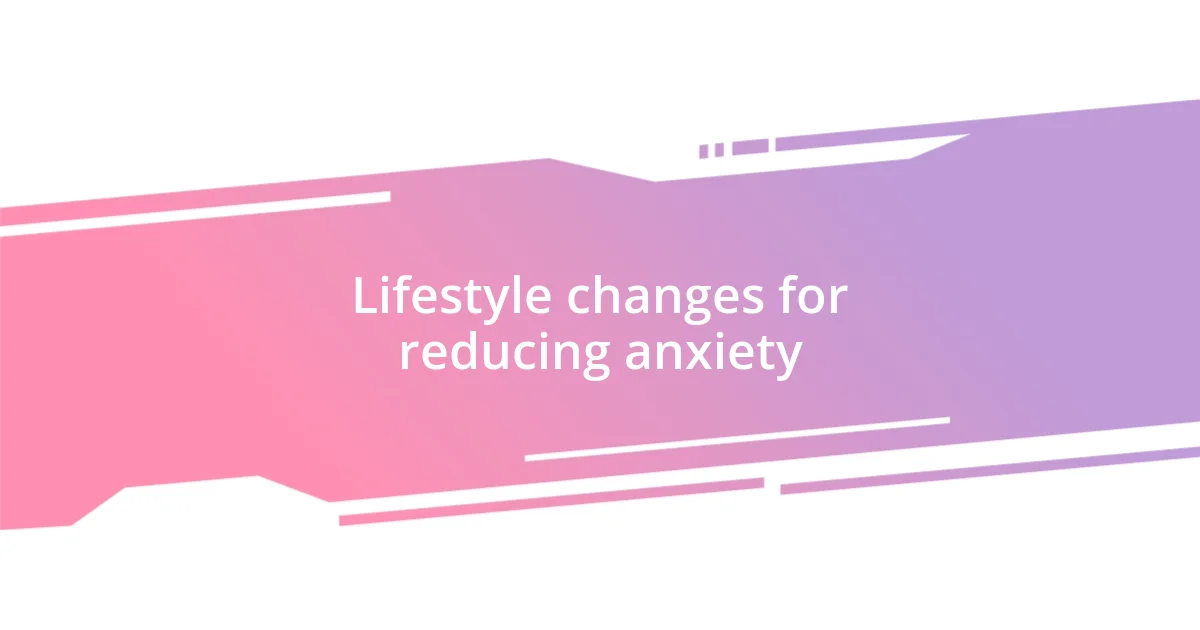
Lifestyle changes for reducing anxiety
Making lifestyle changes to reduce anxiety has been a game changer for me. I realized that simply altering my daily routine could drastically affect how I feel. For instance, when I cut down on caffeine, I noticed I was less jittery and my thoughts became clearer. Have you ever tried limiting your caffeine intake, perhaps noticing a change in your overall mood?
Additionally, establishing a consistent sleep schedule was pivotal. In my early days of battling anxiety, I’d often stay up late, scrolling through my phone. This not only affected my rest but amplified my anxious thoughts the next day. Once I committed to going to bed and waking up at the same time daily, I felt more energized and less overwhelmed. What about you? Have you ever experienced the transformative power of a good night’s sleep?
Lastly, I can’t overstate the importance of nurturing connections with people who uplift me. Surrounding myself with positive and supportive friends has provided me with a safety net during tough times. There’s a certain comfort in just talking about my experiences, which has drastically lessened my feelings of isolation. Have you found comfort in sharing your struggles with trusted friends or family?
| Lifestyle Change | Personal Experience |
|---|---|
| Reducing Caffeine | Less jitteriness and clearer thoughts. |
| Consistent Sleep Schedule | More energy and reduced overwhelm. |
| Nurturing Positive Connections | Greater comfort and less isolation. |
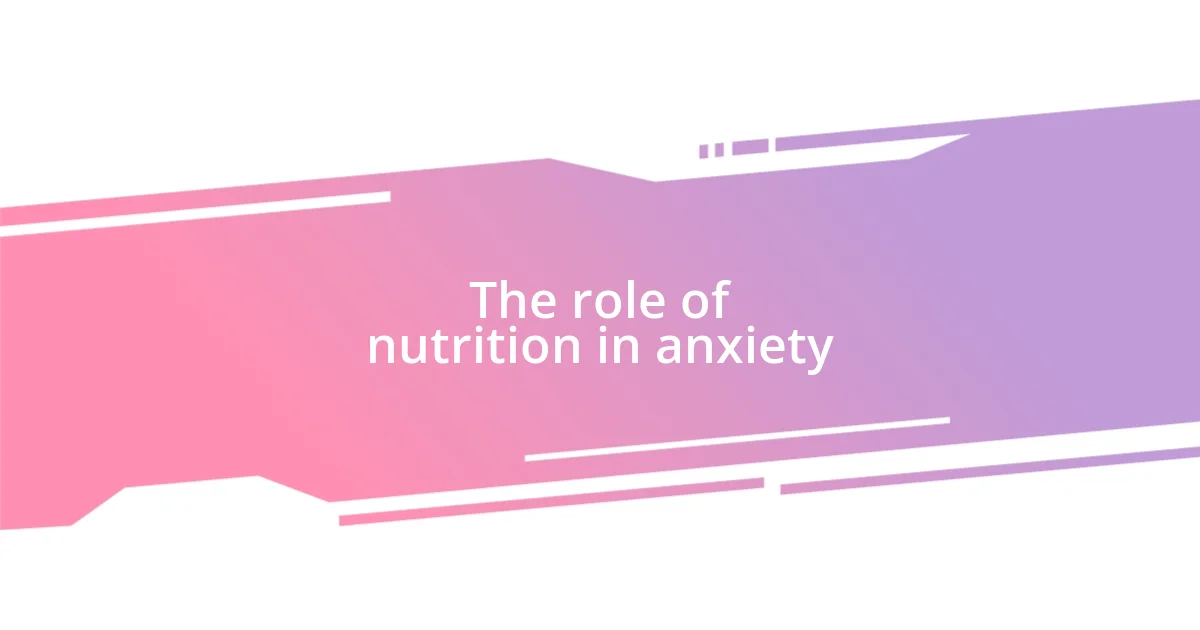
The role of nutrition in anxiety
Eating well has turned out to be a surprising ally in my battle against anxiety. I remember a time when I’d snack on processed foods, thinking it wouldn’t affect my mood. Once I shifted to a diet rich in whole foods—think leafy greens, nuts, and lean proteins—I felt noticeably calmer and more balanced. Have you ever considered how your meals might shape your mental state?
The connection between gut health and mental well-being is fascinating. I learned that the gut produces neurotransmitters like serotonin, which plays a crucial role in happiness and anxiety levels. By incorporating probiotics—like yogurt and fermented foods—into my diet, I noticed a significant shift in my mood. It’s amazing how what we eat not only nourishes our bodies but can also influence our emotional health.
Hydration, too, can’t be overlooked. I used to underestimate how drinking enough water could impact my anxiety. When I made a conscious effort to stay hydrated throughout the day, I found that it helped me think more clearly, reducing those nagging feelings of overwhelm. It leads me to wonder: how often do we overlook the simplest solutions for our well-being?
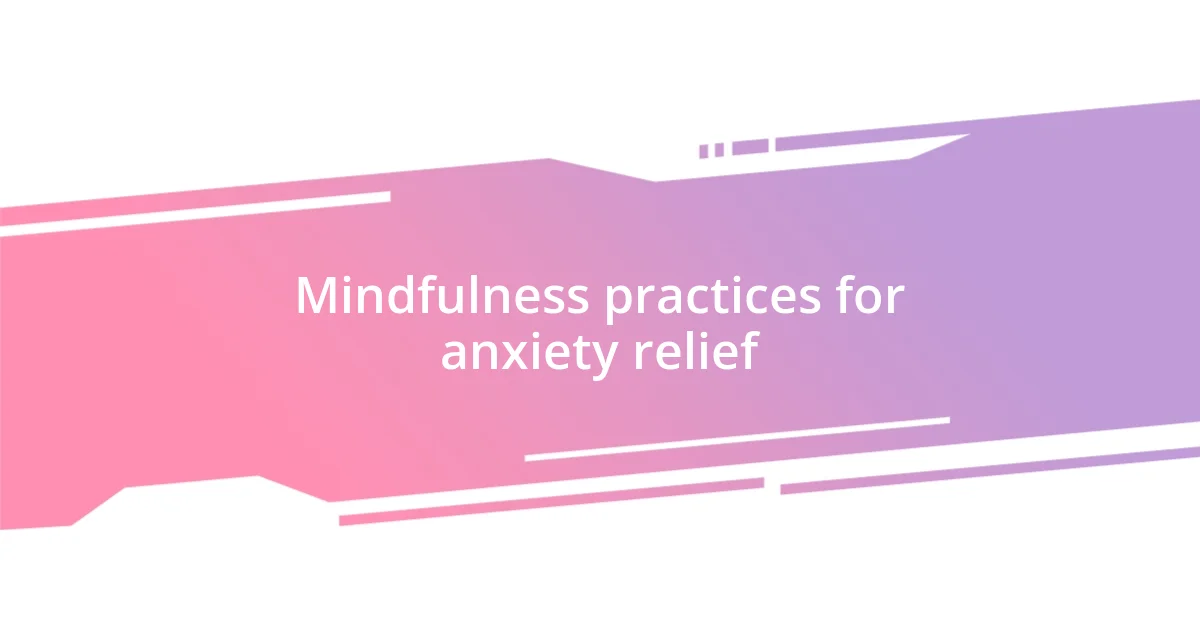
Mindfulness practices for anxiety relief
Mindfulness practices have played a vital role in my journey toward anxiety relief. One of my favorite techniques is mindful breathing. I remember the first time I focused solely on my breath; it felt like hitting a reset button in my mind. As I inhaled deeply and exhaled slowly, the swirling thoughts in my head began to settle. Have you ever paused your day just to breathe? It’s astonishing how just a few moments of awareness can ground you.
Another practice I cherish is mindful walking. I often take strolls in nature, immersing myself in the sights and sounds around me. There’s something about feeling the earth beneath my feet that calms my racing heart. While I walk, I notice the rustle of leaves, the warmth of sunlight, and even the intricacies of flowers. It brings me back to the present. Have you tried bringing mindfulness into your daily walk?
A fun addition to my routine is journaling, where I jot down my thoughts and feelings without judgment. On days when anxiety feels overwhelming, I find that putting pen to paper brings clarity. It’s like emptying a cluttered attic in my mind—suddenly, I see everything laid out and can approach it more calmly. How about you? Have you ever considered journaling as a tool for processing anxiety?
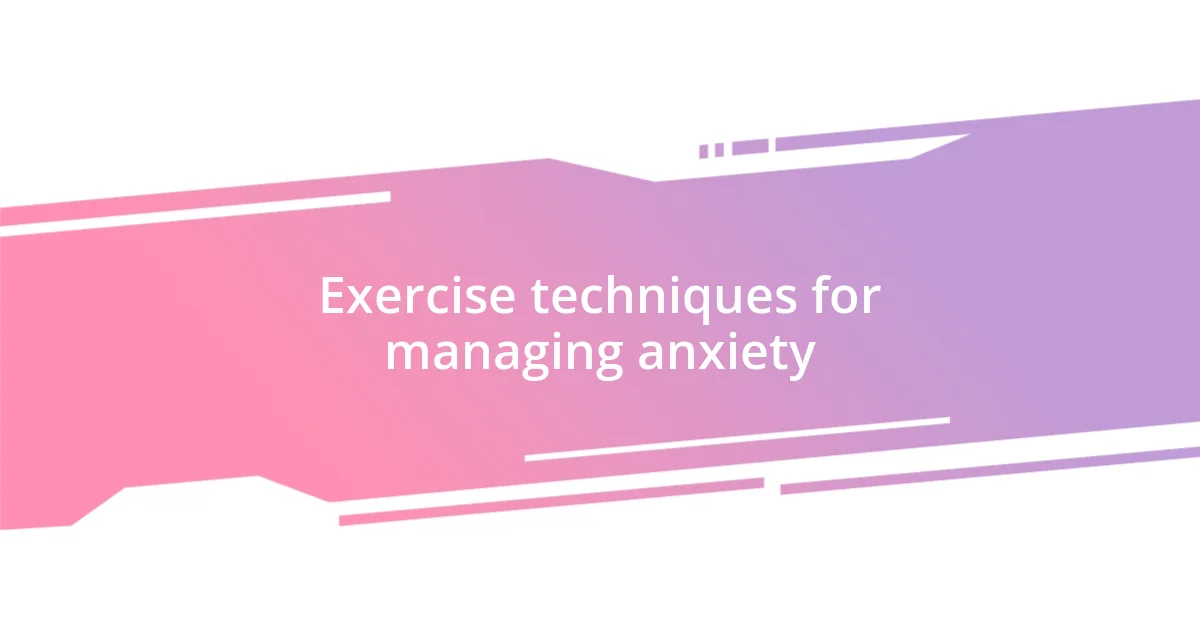
Exercise techniques for managing anxiety
I’ve found that incorporating movement into my daily routine has been transformative for managing anxiety. For instance, I stumbled upon yoga during a particularly high-stress period, and it quickly became my sanctuary. The blend of stretching and focused breathing felt like a gentle release for my pent-up tension. Have you ever tried a downward dog just to let go of your worries? It’s incredible how just a few minutes on the mat can shift my mindset.
High-intensity interval training (HIIT) is another technique I’ve embraced, especially on days when I need a serious energy boost. I remember one session where I pushed myself to my limits, and afterward, I felt an exhilarating sense of accomplishment. The endorphins from that workout not only cleared my mind but also gave a lasting lift to my mood. It makes me wonder: how often do we forget the amazing power of a good sweat session to turn our mental state around?
Then there’s dancing, which for me has become an unexpected joy in anxiety management. There’s something liberating about moving to my favorite tunes, whether in my living room or at a dance class. It’s like my body knows how to shake off the worries while I lose myself in the rhythm. Have you ever danced your way through a tough day? It’s a fun reminder that exercise doesn’t always have to be structured; sometimes, it just needs to feel good!












